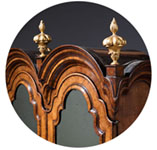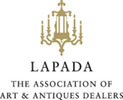A George II Irish Mahogany Secretaire Kneehole Bookcase Att. C. Hearn
£45,900
Request Information
Follow Us
A George II Irish Mahogany Secretaire Kneehole Bookcase Att. C. Hearn
An original and rare two-part George II 18th century Irish architects figured mahogany secretaire bookcase, circa 1760, Ireland.
Attributed to Christopher Hearn of Dublin.
An impressive carved eagle looking to the left is surmounted to the broken scrolling pediment flanked by flowers above a pair of moulded panelled doors enclosing three shelves above a pair of two short oak-lined drawers. Sitting on a moulded kneehole desk with a large fitted drawer opening to an inset retractable leather writing surface concealing four drawers, a removable ink tray and numerous compartments above a central blind and shaped apron concealing a drawer. To each side of the kneehole is a run of three oak-lined graduating lipped drawers and a further three drawers of the same fashion are neatly concealed within the kneehole itself. Raised on a moulded base and what is known as double bracket feet.
Further reading:
This bureau-dressing-table and cabinet reflects the George II Romano/British fashion promoted by Richard Boyle, 3rd Earl of Burlington and 4th Earl of Corke (d. 1753), who served as George II’s Lord Lieutenant of Ireland. Roman virtue is evoked by a Roman eagle crowning its triumphal-arched and scalloped temple pediment, whose waved volutes bear roses, sacred to Venus as a goddess of Love, and these are sculpted in chivalric gothic fashion.
Condition
Good. Wear consistent with age and use. Superb original condition, fabulous colour. All hardware appears to be original.
Dimensions
Height: 94.1 in. (239 cm)
Width: 40.56 in. (103 cm)
Depth: 22.84 in. (58 cm)
Provenance
Private collection Hampshire by descent to the current owner.
Previously purchased from Bennett & Stow, Alresford, 9th May 1979.
Millington Adams 2004.
Literature
A notably similar cabinet supplied to Lady Cobbe for Newbridge House, co Dublin in 1764 attributed to Christopher Hearn is published in the ‘The Knight of Glin and James Peill’ p. 121, pl.163 (with the only difference being mirrored to the doors).
PREVIOUSLY SOLD
No Results Found
The page you requested could not be found. Try refining your search, or use the navigation above to locate the post.
No Results Found
The page you requested could not be found. Try refining your search, or use the navigation above to locate the post.
YOU MAY ALSO LIKE
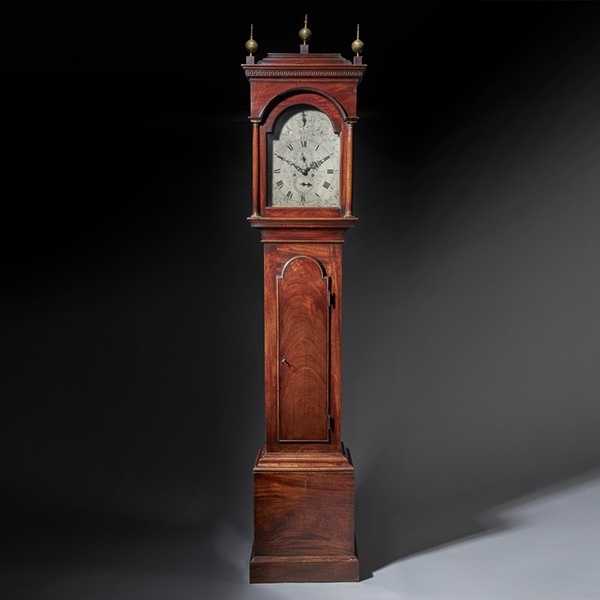
Fine George III 18th Century Period Mahogany Longcase Clock by Tomas Fowle
18th Century Period Mahogany Longcase Clock by Tomas Fowle £12,995 Follow Us18th Century Period Mahogany Longcase Clock by Tomas Fowle A fine George III period mahogany longcase clock of excellent colour, patination and proportions, circa...
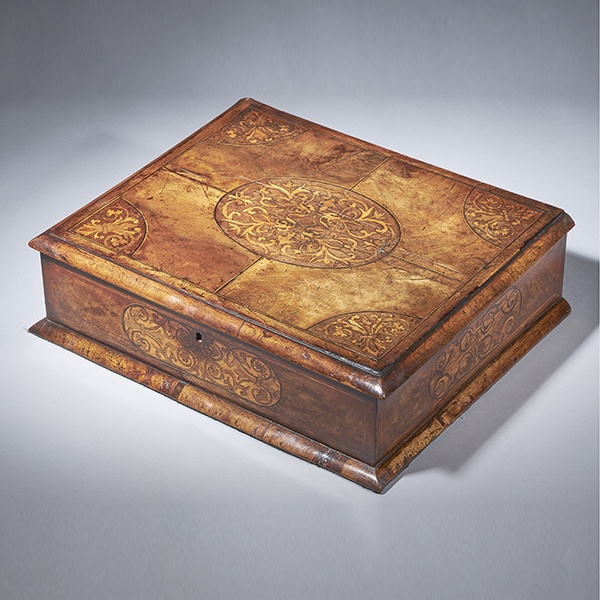
17th Century Figured Walnut and Seaweed Marquetry Lace Box
17th Century Figured Walnut and Seaweed Marquetry Lace Box £3,600 Follow Us17th Century Figured Walnut and Seaweed Marquetry Lace Box A fine and extremely rare figured walnut and seaweed marquetry 'lace box', circa.... let’s break it down -...
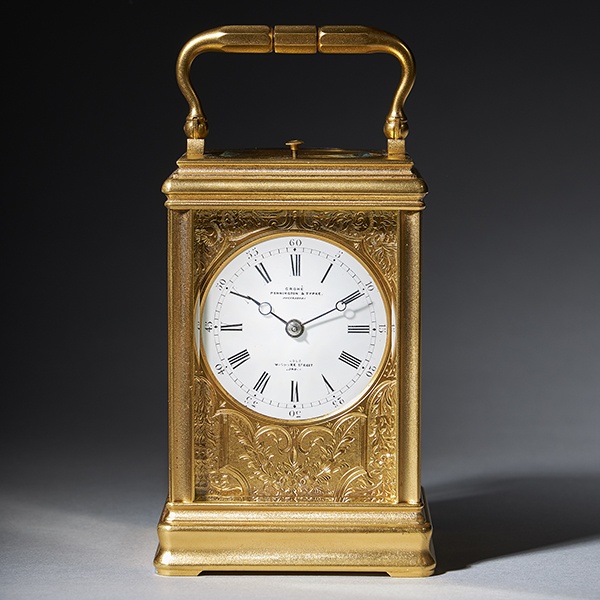
19th Century Repeating Gilt-Brass Carriage Clock by the Famous Drocourt
19th Century Repeating Gilt-Brass Carriage Clock by the Famous Drocourt £5,600 Follow Us19th Century Repeating Gilt-Brass Carriage Clock by the Famous Drocourt A superb repeating carriage clock with a gilt-brass gorge case by the famous maker...
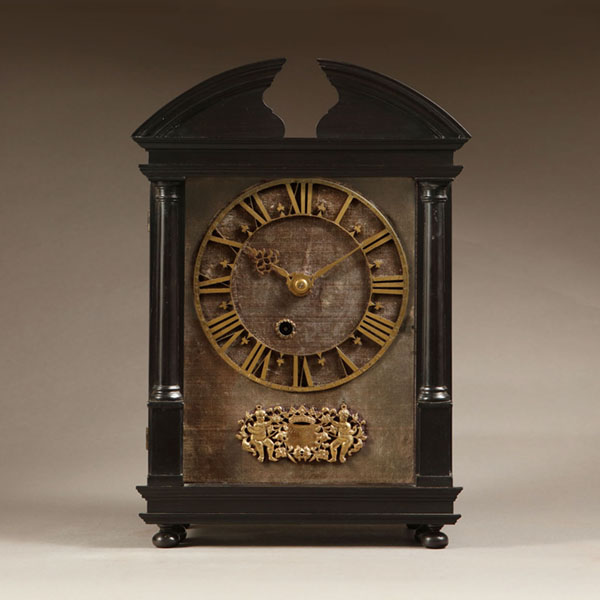
17th-Century Hague Clock Signed by Pieter Visbagh, circa 1675
Small 17th Century Hague clock made c. 1675 by Pieter Visbagh, who was apprenticed by Salomon Coster. The latter made the first pendulum clock according to the instructions of Christiaan Huygens, the internationally renowned scientist who developed the idea of applying a pendulum to a clock movement.
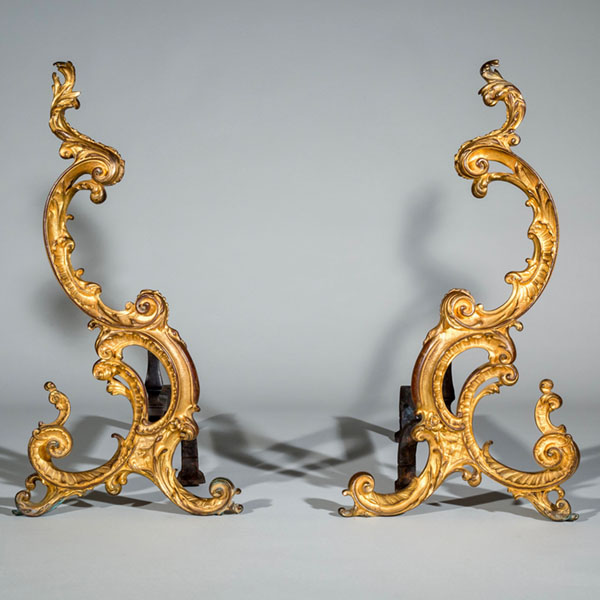
Pair of 18th-Century English Rococo Gilt Bronze Andirons or Firedogs
An exceptional pair of 18th century English Rococo gilt bronze andirons or fire dogs.
The bold shape of these andirons relate to designs of Thomas Johnson (1714–1778), one of London’s pioneers of the ‘Modern’ or French style, later known as Rococo.
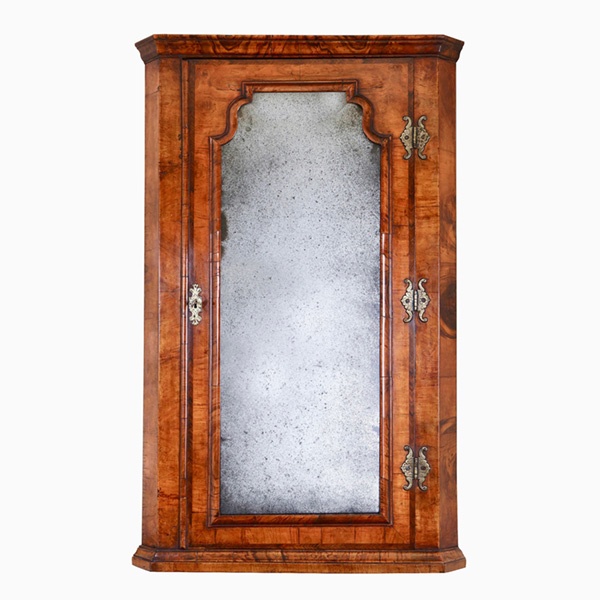
Queen Anne Walnut Corner Cupboard with Bevelled Mirror Plate
A truly remarkable find in original condition. To the door a shaped soft bevelled mirror plate is framed by a cross-grain molding of typical queen Anne design which is further cross-banded, feather-banded and edged to the opening with a single de-molding.

Fine George III 18th Century Period Mahogany Longcase Clock by Tomas Fowle
18th Century Period Mahogany Longcase Clock by Tomas Fowle £12,995 Follow Us18th Century Period Mahogany Longcase Clock by Tomas Fowle A fine George III period mahogany longcase clock of excellent colour, patination and proportions, circa...

17th Century Figured Walnut and Seaweed Marquetry Lace Box
17th Century Figured Walnut and Seaweed Marquetry Lace Box £3,600 Follow Us17th Century Figured Walnut and Seaweed Marquetry Lace Box A fine and extremely rare figured walnut and seaweed marquetry 'lace box', circa.... let’s break it down -...

19th Century Repeating Gilt-Brass Carriage Clock by the Famous Drocourt
19th Century Repeating Gilt-Brass Carriage Clock by the Famous Drocourt £5,600 Follow Us19th Century Repeating Gilt-Brass Carriage Clock by the Famous Drocourt A superb repeating carriage clock with a gilt-brass gorge case by the famous maker...

17th-Century Hague Clock Signed by Pieter Visbagh, circa 1675
Small 17th Century Hague clock made c. 1675 by Pieter Visbagh, who was apprenticed by Salomon Coster. The latter made the first pendulum clock according to the instructions of Christiaan Huygens, the internationally renowned scientist who developed the idea of applying a pendulum to a clock movement.

Pair of 18th-Century English Rococo Gilt Bronze Andirons or Firedogs
An exceptional pair of 18th century English Rococo gilt bronze andirons or fire dogs.
The bold shape of these andirons relate to designs of Thomas Johnson (1714–1778), one of London’s pioneers of the ‘Modern’ or French style, later known as Rococo.

Queen Anne Walnut Corner Cupboard with Bevelled Mirror Plate
A truly remarkable find in original condition. To the door a shaped soft bevelled mirror plate is framed by a cross-grain molding of typical queen Anne design which is further cross-banded, feather-banded and edged to the opening with a single de-molding.
